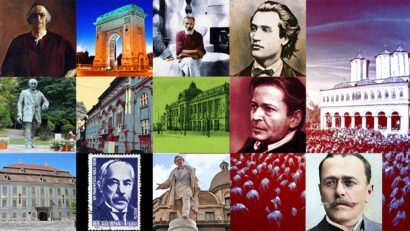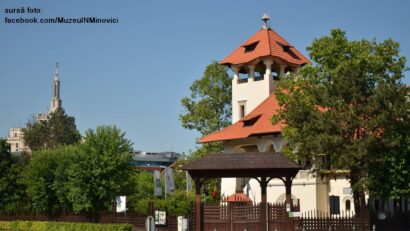Writer Mircea Ivanescu
Among the Romanian writers who were at the height of their creativity during communism, poet and translator Mircea Ivanescu was a special presence.

Christine Leșcu, 04.08.2018, 13:41
Among the Romanian writers who were
at the height of their creativity during communism, poet and translator Mircea
Ivanescu was a special presence. He was born on 26 March 1931 in Bucharest. He
started publishing poetry in the late 1960s and was part of the same generation
of poets who were very much appreciated by the public and critics, such as
Nichita Stanescu. Ivanescu’s influence in poetry, however, extended beyond his
generation, manifesting in the 1980s, up until the 2000s. Meanwhile, he was
also celebrated as a great translator of English language poetry, as he
produced the most appreciated translations from authors such as James Joyce,
William Faulkner, Ezra Pound, or Sylvia Plath. His life was spent in a universe
of books, pervaded by music, in search of the answer to the question What is
truth?, but also under the shadow of the obsession with death.
When he was 11, his brother Emil,
then 22 years old, killed himself, leaving Mircea Ivanescu scarred by the
disappearance of his beloved and talented brother. According to poet Radu
Vancu, who wrote the book ‘Mircea Ivanescu. The Poetry of Absolute Discretion’,
he suffered from survivor’s guilt, and was a man without a biography, because
literature was his life. On the outside, he had a rather plain existence. He
graduated from the School of Letters at the University of Bucharest, then went
on to work at The World magazine and
the Agerpres news agency. In 1980 he moved to Sibiu, where he worked for the Transylvania magazine. He lived there
until his death in 2011. Poet Radu Vancu told us that his universe, heavily
reflected in his poetry, consisted of literature, music, his friends, his wife
Stela, but also his cats:
When he became an adult, his poetry
was pervaded by musical references, especially Chopin, his and his brother’s favourite
composer. For him, music was not something relaxing, having to do with
celebrating existence, on the contrary, it had funereal overtones, adding to
the secret death that is present throughout Mircea Ivanescu’s poetry. On the
surface, his poetry, as poet Mircea Cartarescu observed, sounds like a cafe
concert poetry. It does not give the impression that something dramatic is
going on beneath the surface. However, if you read it like a detective, slowly
and obsessively, you notice that it bears an obsession with death and truth
through and through.
or a long time during the communist
regime, Mircea Ivanescu’s poetry was somehow peripheral, as the columnists who
were writing weekly reviews very much favoured other poets’ more metaphorical
and more flamboyant style. With details on that, here is Radu Vancu once again.
His
success with the critics occurred during the communist regime. From the very
first volumes, the most authorized voices rated him as a great poet. I have in
mind critics Matei Calinescu, Ion Negoitescu, Lucian Raicu. Unfortunately, the
most influential columnists of the time did not perceive him similarly, that is
Nicolae Manolescu and Eugen Simion. Manolescu, however, admitted, in the late
1980s, that Ivanescu wrote a great inter-textual poetry. Yet there was another
explanation for that, which has nothing to do with the critics’ response to his
poetry at that time, but rather with the nature of his poetry. He wrote an
apparently non-metaphorical, biographical, and narrative kind of poetry. So his
poetry rather resembles that written by the younger generations, launched in
the 1980s and in 2000, so there is no wonder that they especially perceived him
as a great poet, acknowledging his major influence over their own work.
After
1990, the change in perception of Mircea Ivanescu’s poetry did not change the
poet himself. Speaking about that, here is Radu Vancu again.
Actually,
he sort of opted for keeping himself to himself, as regards literature. He
hadn’t been writing any kind of poetry since 1997. So in the last 14 years of
his life he was not active as a poet. I used to fetch him paper clips from the
literary press that emphasized those changes in the way people perceived his
work. He dealt with that in a very ironic manner. I would tell him an important
critic named him a great poet, and he would ask if that critic had used the
word ‘genius’ as well. My answer would be ‘no’, so he would say something like ‘then
it’s useless’. It was his way of protecting himself from such excessive praise.
He wasn’t fishing for and was no interested in being praised. Another tragedy had occurred in his life: in
1999, his wife, Stela, died, and it was to her that he had dedicated all his
volumes of poetry. Her death made him lose any interest in living. Success did
not change him. He remained the same generous man, with an extraordinary cult
of friendship, yet with a perception about himself that was extremely
self-deprecating and self-ironical. In fact, his modestly was
self-destructive.
On
July 21, 2011, Mircea Ivanescu died at the age of 80. He left behind lots of
translated works and poetry which are still worth discovering.





























